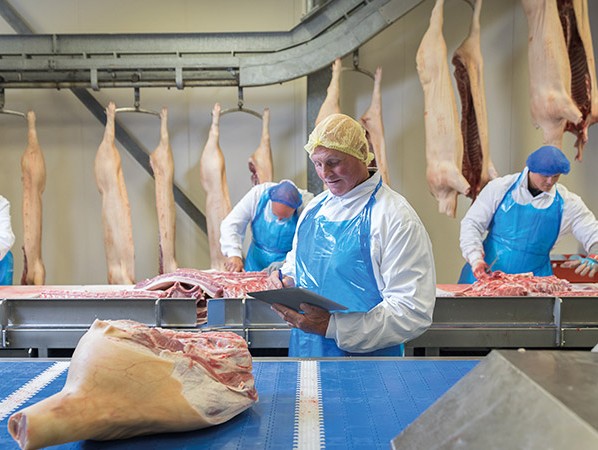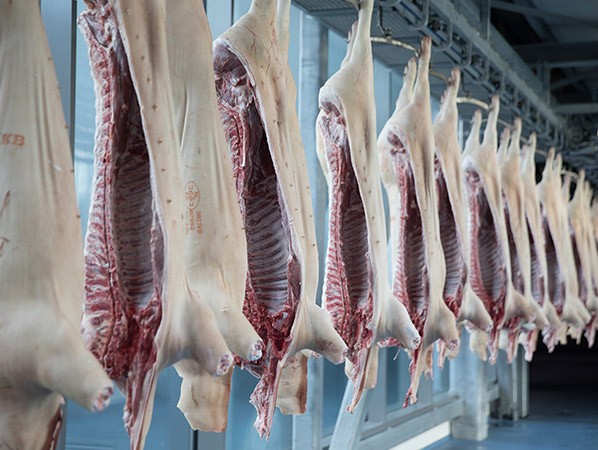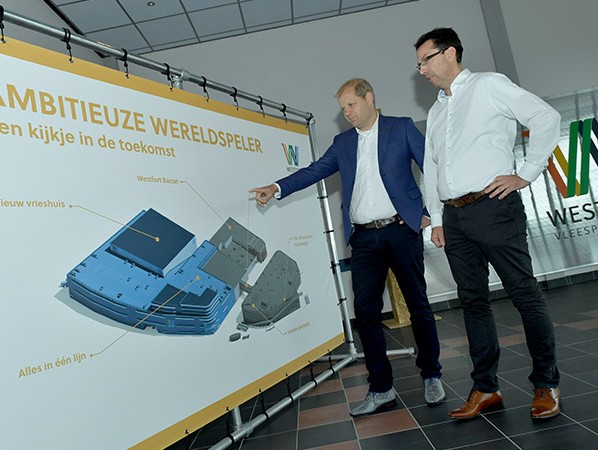
A state of the art slaughterhouse was established in IJsselstein in 2015. With this sophisticated company, Westfort Meat Products builds on a long history in pork meat. With a vision of the future aimed at growth, return, and automation.
2013 saw the merger between the family-owned businesses Egbert Kruiswijk Vleesproducten B.V. and Lunenburg Vlees B.V. Under the new name Westfort Meat Products, the company immediately made plans for the future, such as centralising all operational activities in IJsselstein. The modern slaughterhouse was built in 2015, and the building of the new meat processing site will start early 2019.
Further development plans were also drawn up for the supporting aspects of the company process as growth and return cannot be achieved by just centralising and expanding the production. ICT plays a vital role in this as well. Since 2015, Board Member Robbert van 't Hoff is responsible for ICT, HR, and Finance. A man who feels at home in the world of meat as well as computers. He stems from a line of six generations of butchers and combines his knowledge about meat with his ICT expertise. His affinity with ICT was once ignited by his father's passion for computers.
Robbert wants to make Westfort a frontrunner in the business when it comes to automation. The company focuses on the long term and makes choices that will show success in two, three years. “As a company, you have to be prepared to invest in ICT for the support, adjustment, and constant innovation of the operational processes.” And he is not willing to take half measures. "Your company should not be forced to adjust itself to the software. The software is there to support your operations, and not the other way around."

Immediately after the merger, it was decided that all locations would transfer to one new platform, the FOBIS® ERP system of the RBK Group in Deventer. Before the merger, Westfort worked with several suppliers and multiple systems, and in Oudewater they had been using RBK for over 20 years. When choosing the new ICT platform, the choice was not steered by individual preferences but by the general interest. The new ERP system had to comply with three goals: it has to add value for the client, so he will get exactly what he wants; ICT needs to optimally support the operational processes in the complex company; and the collected data needs to lead to more insight and actions (actionable insights).
Robbert finds it important that a supplier of ERP systems is aiming for the same goals: "It must be part of the DNA of the company and its employers that their product optimally serves and supports the client and the operational processes". The choice for RBK was also confirmed because they continuously develop their ERP solutions. This can be achieved by working with a sophisticated development environment and an excellently defined data model. Peter Harmens, Managing Director and Partner of the RBK Group is very pleased with Westfort's choice. "When a company with such a pioneering vision on ICT makes such a choice, it also confirms to us that we deliver a top-quality product and that the client has been satisfied with our collaboration over the past 20 years. We have many clients in the food industry and receive a diverging range of questions and requests. It is our challenge to familiarise ourselves with the process behind the question, and to find a generic solution that can also be used by other clients."

The implementation process was jointly designed by the ICT team of Westfort and RBK in a phased plan. First, the new software was implemented in the production process, then the order-entry and, lastly, the invoicing. Peter gladly explains this work method: "For us, as the supplier, it is worthwhile to collaborate closely with the client during the development stage, especially when a client wants to take big steps forward and we can support this". He agrees that taking one step at the time is a good choice. "The impact of working with a new system is substantial. Employees have to get used to it, operational processes must be clear in order to enter them into the system. This was no problem at Westfort, there is structure, clarity, and the employees easily adapt to the new method." The new FOBIS® reporting tool has also been implemented. The data of Westfort is not just up to date, but also complete as the ERP system is linked to other automation tools within the company.
This gives Westfort a continuous and real-time insight into the complete data of the company. "The objective is to use business intelligence tools to turn your data from the ERP system into insights which lead to actions and improvements", adds Robbert.
As a network manager, RBK also unburdens Westfort in this regard. Westfort employs its own application administrator who, for example, adjusts views, so that the employees can see the information they need on the screens. This application administrator is also trained to use the reporting tool so he can make the reports. Robbert is an advocate of this independence as it allows for a faster realisation of the adjustments that the users need and which will help them to work better. "This is a scrum work method. It makes us more flexible and the satisfaction level of the user is high. When we do need help, we can call on the consultants of RBK. A wonderful collaboration in which we can keep developing ourselves, grow, and achieve successes!"
Source: © Westfort